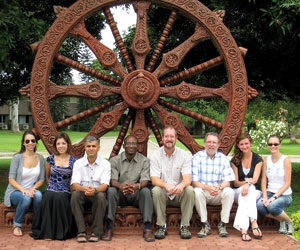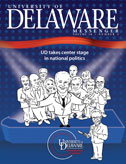India offers a look at sustainable agriculture

RESEARCH | Providing safe, nutritious food for a growing world population can take its toll on natural resources, especially in developing countries.
Now, five faculty members and four students in the College of Agriculture and Natural Resources are studying the U.S. and India to look at ways in which sustainable management practices can help boost agricultural production with the environment in mind.
Led by Shreeram Inamdar, associate professor of bioresources engineering, the team embarked on a 10-day visit to India over the summer as part of a project funded by the International Science and Education program of the U.S. Department of Agriculture. The University is working in collaboration with the United Nations International Crop Research Institute for the Semi-Arid Tropics (ICRISAT), with headquarters near Hyderabad, India.
“The intent of the project is to enhance and enrich the knowledge of students and faculty in the U.S. about sustainable management practices being adopted in developing countries, such as India, and spawn new international research collaborations,” Inamdar says.
The students—Rachael Vaicunas, Kathryn Zook, Alison Kiliszek and Jennifer Popkin—were accompanied by Inamdar and Titus Awokuse, associate professor of food and resource economics; David Hansen, associate professor of plant and soil sciences; and Tom Sims, professor of plant and soil sciences and deputy dean of the college. Joshua Duke, professor of food and resource economics, also is working with the project but did not travel to India.
ICRISAT has established a number of benchmark watersheds in India, China and Southeast Asia and has implemented a suite of management practices to demonstrate the value of sustainable watershed and agricultural management.
Through a summer internship program funded by the project in 2009, the four students conducted extensive research into the various sustainable management practices implemented by ICRISAT and the impacts these practices had on water and environmental quality, crop productivity, ecology and socio-economic conditions in the targeted watersheds. The students also evaluated the policy and international trade implications of these agricultural practices, and they looked at how the watershed conditions and agricultural practices in India and other developing countries were similar to or different from the conditions in the U.S.
As a part of the internship, the students and professors developed teaching modules that now are being used to enrich the curriculum of eight existing UD courses with international content—one of the key objectives of the project.
An online, stand-alone course on “Sustainable Watershed Management in Developing Countries” also is being formulated using the teaching and information modules developed by the students.
“The visit to India was the second part of the project and was intended to provide the students and faculty a firsthand experience of the agricultural conditions and watershed practices in India,” Inamdar says.
While in India, the group visited with various research teams and laboratories at ICRISAT and explored the on-campus experimental watershed and agricultural conservation practices.
“It was great to be able to connect all of our research and the topics that we included in our teaching modules to on-the-ground projects,” Vaicunas says.
The UD group also visited with scientists and faculty at The Energy Resources Institute (TERI) Center and the TERI University in New Delhi and discussed potential graduate study programs, research opportunities, student exchanges and joint study courses between the two institutions.
Article by Katy O’Connell, AG ’00





